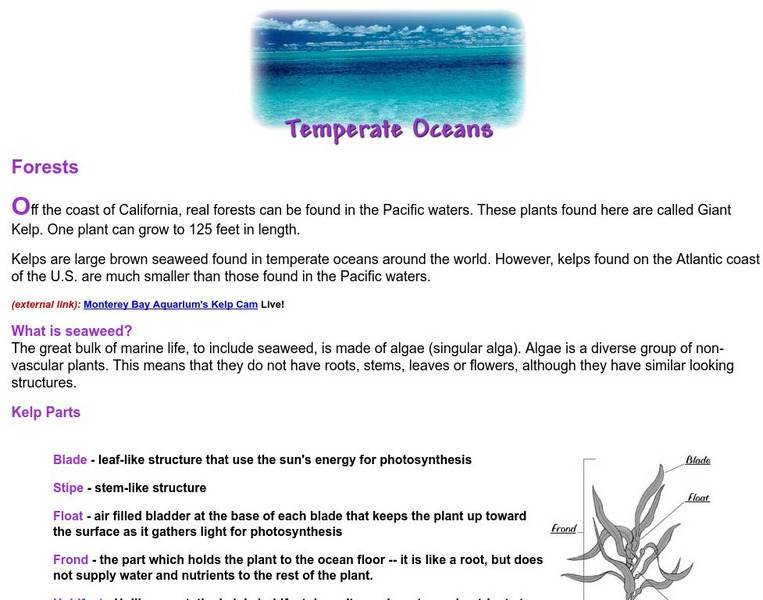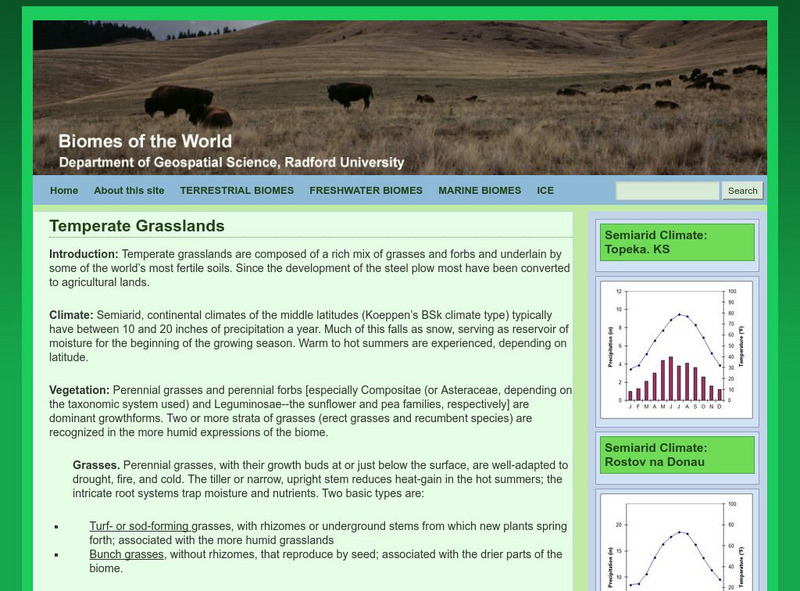Hi, what do you want to do?
Missouri Botanical Garden
Missouri Botanical Garden: Giant Kelp
Learn about forests under the Pacific Ocean! Giant kelp is a forest under the ocean that is divided into layers based on the kind of animal life found there. Kelp is useful in making adhesives, dairy products, and pharmaceutical...
Virginia Tech
Virginia Tech: Flower and Tree Reproduction
This is the reproduction chapter from an online text, courtesy of the Forest Biology Department of Virginia Tech. Learn about trees, their flowers, and other details of their reproductive cycle.
Alabama Learning Exchange
Alex: "Nuts" About Peanuts! (Reading)
The lesson will be implemented as part of a unit about plants. The students will learn about the growth cycle of a peanut and use a Five-Step Sequence Think-sheet to sequence the steps. They will also make predictions and complete...
Alabama Learning Exchange
Alex: 'Nuts' About Peanuts!! (Writing)
This lesson will be implemented as part of a unit about plants. The students will describe the characteristics of a peanut and peanut butter (using their five senses) and record their observations/descriptions on a graphic organizer....
BioEd Online
Bio Ed Online: How Does Light Affect Root Growth?
In this lesson for students from 3rd-12th grades will learn to build an experiment chamber to test the effects of light on Brassica rapa roots, and compare their results with outcomes from plant experiments conducted aboard the...
Smithsonian Institution
National Museum of Natural History: American Mammals: Sagebrush Vole
Sagebrush Voles usually live in colonies in semiarid, partly brushy habitat. The dominant plants where they live are sagebrush or rabbitbrush mixed with bunchgrass. Learn more about the Lemmiscus curtatus, more commonly known as a...
Smithsonian Institution
National Museum of Natural History: American Mammals: Southern Pocket Gopher
Because most Southern Pocket Gophers live at high elevations in the mountains of Mexico, they are less accessible, and have been less-studied, than some other species. Like all pocket gophers, they are vegetarians, consuming both...
Curated OER
Thumbnail
The Canadian north is home to many different kinds of plants and animals. Learn about this interesting part of the world through a beautiful collection of photographs.
Curated OER
Thumbnail
The Canadian north is home to many different kinds of plants and animals. Learn about this interesting part of the world through a beautiful collection of photographs.
Curated OER
Thumbnail
The Canadian north is home to many different kinds of plants and animals. Learn about this interesting part of the world through a beautiful collection of photographs.
Curated OER
Thumbnail
The Canadian north is home to many different kinds of plants and animals. Learn about this interesting part of the world through a beautiful collection of photographs.
Other
Radford University: Temperate Grasslands
This is part of a virtual geography project from Radford University. Learn about the climate, vegetation, grasses, soil and fauna of the temperate grasslands.
Other
Backyard Nature: Roots
Educational site highlights the building block of plants-roots. Discover how they grow, why they are important as well as learn some interesting facts about them.
Curated OER
Thumbnail
The Canadian north is home to many different kinds of plants and animals. Learn about this interesting part of the world through a beautiful collection of photographs.
Curated OER
Thumbnail
The Canadian north is home to many different kinds of plants and animals. Learn about this interesting part of the world through a beautiful collection of photographs.
Curated OER
Thumbnail
The Canadian north is home to many different kinds of plants and animals. Learn about this interesting part of the world through a beautiful collection of photographs.
Curated OER
Thumbnail
The Canadian north is home to many different kinds of plants and animals. Learn about this interesting part of the world through a beautiful collection of photographs.
ClassFlow
Class Flow: Life Cycles
[Free Registration/Login Required] Through this unit, children learn that plants and animals reproduce as part of their life cycle and that in every life cycle there are distinct processes and stages. They should begin to understand how...
Curated OER
Science Kids: Science Images: Plant Cell Structure Diagram
Learn about the structure of a typical plant cell with this informative diagram. The diagram lists important parts such as the nucleus, cytoplasm, leukoplast, cell wall, chloroplast and ribosomes.














